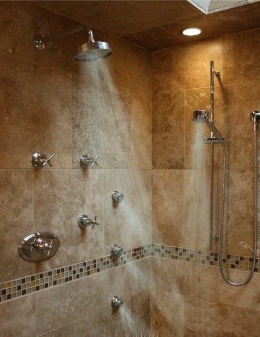We spend a lot of time with consumers in their home watching them interact with products and asking them questions about their likes & dislikes. One thing that never fails to amaze me is the disconnect between what people are buying and what companies are selling.
 In a nutshell, companies sell products. People buy remedies for their pain, or solutions to their unmet needs (choose your analogy). A couple of years ago, we did a project on patio heaters. Looking at the offerings in the marketplace, you could see where each manufacturer had changed the form of the product slightly to differentiate themselves at retail. Little shelves, different shaped posts, multiple domes on the top. I'm sure the respective manufacturers thought they were setting themselves apart with their "unique" styling. And from their perspective, they all put out heat, which is what they were designed to do.
In a nutshell, companies sell products. People buy remedies for their pain, or solutions to their unmet needs (choose your analogy). A couple of years ago, we did a project on patio heaters. Looking at the offerings in the marketplace, you could see where each manufacturer had changed the form of the product slightly to differentiate themselves at retail. Little shelves, different shaped posts, multiple domes on the top. I'm sure the respective manufacturers thought they were setting themselves apart with their "unique" styling. And from their perspective, they all put out heat, which is what they were designed to do.
We spent many cool evenings with consumers, on their patios and decks so that we could better understand how to improve upon this offering. The first thing we learned was that the products on the market were "all the same" from a home-owner's perspective. The efforts toward differentiation was lost on them. More importantly, we learned that patio heaters were not strictly about outdoor warmth (as had always been assumed). It was really about enabling consumers to entertain outdoors. We heard comments about how much easier it is to hose off the deck after a party than to clean red wine off the light colored carpeting indoors. Outdoor parties were seen as less formal, more friendly and generally more fun. Patio heaters help people to move their parties outdoors.
 While on the surface, that might not seem breakthrough, that is a finding that should reinvent the category. Once you are in the outdoor party business, you start to incorporate new attributes into your product. Other unmet needs like lack of surface space for plates and drinks, need for additional ambient lighting, and fire as a focal point all start to come into play. Our client introduced a couple of award winning heaters that satisfied some of these other needs as well. One walk through a big-box retailer this spring, and you'll see that this notion has caught on across many providers. Low round tables with gas logs burning in the center, natural gas heater/lamp combinations, other forms of heater tables can all be found. It seems everybody is trying to help people entertain outdoors these days... the market may be shifting. So, what is it that you are really selling? Are you sure that's what people are actually buying? If your market is shifting to a new direction, are you ready to still support it? Most importantly, how do you know?
While on the surface, that might not seem breakthrough, that is a finding that should reinvent the category. Once you are in the outdoor party business, you start to incorporate new attributes into your product. Other unmet needs like lack of surface space for plates and drinks, need for additional ambient lighting, and fire as a focal point all start to come into play. Our client introduced a couple of award winning heaters that satisfied some of these other needs as well. One walk through a big-box retailer this spring, and you'll see that this notion has caught on across many providers. Low round tables with gas logs burning in the center, natural gas heater/lamp combinations, other forms of heater tables can all be found. It seems everybody is trying to help people entertain outdoors these days... the market may be shifting. So, what is it that you are really selling? Are you sure that's what people are actually buying? If your market is shifting to a new direction, are you ready to still support it? Most importantly, how do you know?






